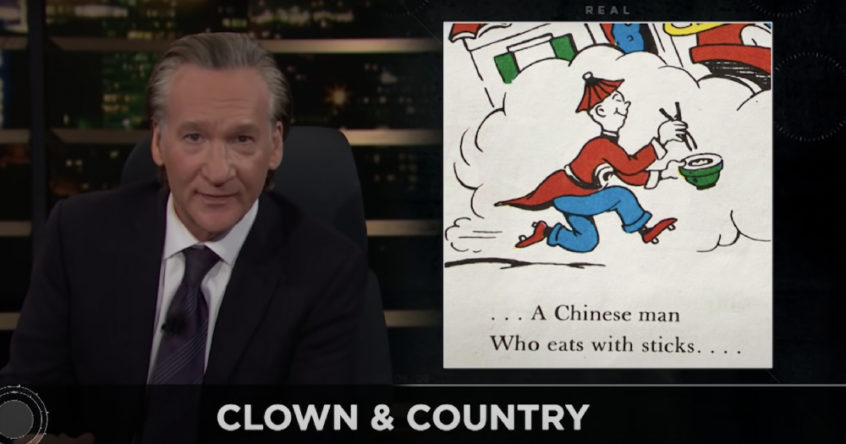“You know who doesn’t care that there’s a stereotype of a Chinese man in a Dr. Seuss book?” Bill Maher asked on Real Time.
“China,” he answered. “All 1.4 billion…because they’re not a silly people,” unlike Americans. Maher was referring to Seuss’s fall from grace for being racially insensitive.
Maher should Think Again about Americans, considering the sales bonanza enjoyed by shunned classics, including six books canceled by Dr. Seuss Enterprises, epic film Gone with The Wind, and Mr. Potato Head.
Though securing freedom of choice with our wallets, Americans must wage a fuller-throated defense of the American Idea, that a diverse people can forge a freer and fairer nation by hashing out differences civilly.
Even French politicians and prominent intellectuals fear America’s illiberal social theories which prominent African American academic Glenn Loury called “a formula for tyranny and more racism” in his recent Congressional testimony.
It’s an apt description considering efforts to cancel Shakespeare and Beethoven for being white men. Same for the forced resignations of Alexi McCammond, Teen Vogue’s black editor-in-chief, over her teenage tweets, and 45-year New York Times science reporter Donald McNeil Jr for repeating the N-word when asked about it.
Actor Ralph Fiennes recently denounced our “age of accusation” while defending J.K. Rowling, who’s accused of transphobia. It’s “disturbing” the “hatred that people express about views that differ from theirs, and the violence of language towards others.”
Mere plebeians have no such defense, as detailed in a NYT story about Smith College where service workers earning less than one year’s tuition were falsely accused of racially profiling a student.
Nevertheless, Smith launched obligatory and accusatory “anti-bias” training so unbearable, Jodi Shaw – a self-described liberal and Smith graduate – resigned her administrative post, refusing a settlement to “remain silent.”
Her resignation letter is an indictment of our dehumanizing, illiberal, and neo-racist moment in which “people’s worth is determined by the color of their skin,” and “failing to swear fealty…is grounds for public humiliation and professional retaliation.”
Having chosen freedom over comfort and to seek legal recourse, Shaw wrote, “my children’s future, and indeed, our collective future as a free nation, depends on people having the courage to stand up to this dangerous and divisive ideology.”
Shaw’s efforts reflect the ideas of philosopher Karl Popper who coined Paradox of Tolerance in 1945: “In order to maintain a tolerant society, the society must be intolerant of intolerance,” countering the intolerant “by rational argument and keep[ing] them in check by public opinion.”
Can we check intolerance amid the “new McCarthyism,” and the self-censorship it induces? Yes, when silent majorities speak out, like falling dominoes they’ll recover human dignity and civility. Just as our bodies and spirits crave liberation from quarantine, so do our minds and voices.
But “civility is more than good manners,” the late Rabbi Jonathan Sacks wrote in Morality: Restoring the Common Good in Divided Times. Civility “is a recognition that listening respectfully to your opponents is a necessary part of the politics of a free society; and that liberal democracy, predicated … on the dignity of diversity, must keep the peace between contending groups by honoring us all equally, in both our diversity and our commonalities.”
Civility means speaking to the better angels of our nature, recognizing Soviet dissident Alexandre Solzhenitsyn’s insight that “the line separating good and evil passes through every human heart.” That’s why we should think of our life’s deeds as perfectly balanced helping us strive to tip the scale toward the good, as rabbinic sage Maimonides taught.
So why not try loving your neighbor as yourself? If the best way to change the world is by changing the people in it, as Sacks urges, shouldn’t we endeavor to engage people, their ideas and values? Imagine listening with radical curiosity to someone with differing beliefs and having them reciprocate. Then try engaging in conversation where you express their views, and they yours.
Might radical curiosity and respect stimulate mutual trust and understanding, illuminating unseen common ground? Might it become clearer that no one has a monopoly on virtue or vice, restoring the ethic “to err is human, to forgive is divine?”
Think Again – wouldn’t we be a sage people with a more perfect union if we granted each other the right to an opinion on how to achieve it, and the grace to be wrong?
This latest column is the sequel to Want unity? Tame the pandemic, and I don’t mean COVID.

